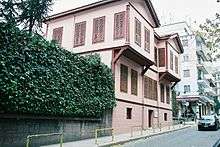Atatürk Museum (Thessaloniki)
The Atatürk Museum (Greek: Μουσείο Ατατούρκ, Mousío Atatúrk, Turkish: Atatürk Evi Müzesi, Atatürk House Museum) is a historic house museum in Thessaloniki, Central Macedonia, Greece.
Atatürk Evi Müzesi | |
 Ataturk's house in Thessaloniki, part of the Turkish consulate complex. | |
%26groups%3D_b89d34f644c6c2ccbbb96f16dc01081d79bcc6e0.svg)
| |
| Established | 1953[1] |
|---|---|
| Location | Thessaloniki, Greece |
| Type | Historic house museum |
| Website | Turkish consulate |
The house is the birthplace of the founder of modern Turkey, Mustafa Kemal Atatürk, who was born here in 1881.[2] It is a three-floor house with a courtyard on 24 Apostolou Pavlou Street, next to the Turkish Consulate. Before the capture of Thessaloniki by the Greek Army in 1912, it was known as "Koca Kasım Paşa district, Islahhane street".[1] It was built before 1870 and in 1935 the Thessaloniki City Council gave it to the Turkish State, which decided to convert it into a museum dedicated to Mustafa Kemal Atatürk. Until the Istanbul pogrom of 1955, the street in front of the house was named "Kemal Ataturk".
The building has three floors and a courtyard. It was repaired in 1981 and was repainted to its original pink. Most of the furniture is authentic. Any missing items were replaced with furniture from Kemal's mausoleum and from Topkapi Palace in Istanbul. There are photographs on all the walls of Kemal at various periods of his life.
There are four rooms on the ground floor. On the 1st floor is the reception room, with European sofas, a large console table, and a chased brazier; a large sitting-room, with low banquettes around the walls; Kemal's mother's room, with a bed, a banquette, and a trunk; and the kitchen, equipped with contemporary cooking utensils. The most impressive room on the 2nd floor is the one in which Kemal was born, a large room with a banquette, his desk, and a large brazier. It faces another room, in which some of Kemal's personal effects from Ankara are displayed. These include formal dress, smoking requisites, cutlery, cups, and other items. All the documents relating to Kemal's schooldays have been hung on the walls. A pomegranate tree planted by Kemal's father still grows in the courtyard.[3]
In September 1955 as the Cyprus EOKA crisis unleashed in the Mediterranean island, a bomb exploded close to the Turkish consulate damaging also the Atatürk Museum. The damage was minimal with some broken windows.[4] but it marked the beginning of anti-Greek pogrom in Istanbul. Six years later the Turkish Prime Minister Adnan Menderes was deposed and a Turkish court found that the bombing had been ordered by his government; Menderes apologized and offered compensation[5] but was sentenced to death charged with promoting the Istanbul pogrom, among other charges.
In 1981 a replica of the house was built in Ankara.
- View from outside
- Wax sculpture
 Living room
Living room Atatürk's sleeping quarters
Atatürk's sleeping quarters Atatürk's personal items
Atatürk's personal items
References
- "Atatürk Evi Müzesi" (in Turkish). www.thessaloniki.cg.mfa.gov.tr/. Retrieved 21 April 2011.
- "Ο βίος και η πολιτεία του Μουσταφά Κεμάλ στη Θεσσαλονίκη". www.makthes.gr. 18 April 2007. Archived from the original on 2013-02-17. Retrieved 21 April 2011.
- Museums of Macedonia web site
- Turkey and the West: From Neutrality to Commitment, p. 310, at Google Books
- Denying Human Rights and Ethnic Identity: The Greeks of Turkey, p. 8, at Google Books

